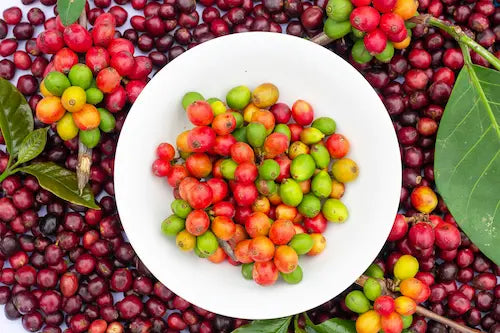Dive into the fascinating world of organic Arabica coffee and discover why organic coffee beans from Peru and Mexico stand out among the finest selections.
They are grown without pesticides or chemicals, are not only a delight for the taste buds, but they also offer a multitude of benefits for your health and the environment. Thanks to their respectful cultivation methods, Peruvian and Mexican producers guarantee exceptional quality while preserving the biodiversity of their lands. In this article, we will explore the captivating aromas and rich flavors that these unique beans have to offer.
Join us on this taste adventure that combines pleasure and ecological awareness, and let yourself be seduced by organic Arabica Chiapaneco coffee like never before.
The characteristics of organic Arabica coffee beans

This variety accounts for approximately 60 to 70% of the world's coffee production, which is a testament to its immense popularity among coffee lovers. Arabica beans are also known for their low caffeine content, making them less bitter and more enjoyable to drink.
Arabica coffee beans are distinguished by their oval shape and slightly larger size than Robusta beans. They have a characteristic S-shaped curve on one side, making them easily recognizable. These organic beans typically grow in Peru and Mexico at high altitudes, often between 800 and 2,200 meters, where cooler temperatures and nutrient-rich soils help develop complex and refined flavors. Ideal growing conditions for Arabica include temperatures between 15 and 24 degrees Celsius and abundant but well-distributed rainfall throughout the year.
The complexity of organic Arabica coffee's aromas is one of its most appealing features. Depending on the growing region, the flavor profile can vary considerably, offering notes ranging from red fruits and berries to nuances of chocolate and nuts. This diversity of tastes makes Arabica a preferred choice for connoisseurs who appreciate specialty coffees by making ristrettos that immediately release their aromas. In addition to its taste qualities, organic Arabica coffee is also valued for its lower environmental impact when grown organically, an aspect we will discuss in more detail in the following sections.
The health benefits of organic coffee


In addition to the purity of the beans, organic Arabica coffee is also rich in antioxidants. These natural compounds play a crucial role in protecting cells from oxidative damage caused by free radicals. Antioxidants found in organic coffee, such as polyphenols and chlorogenic acids, are known for their anti-inflammatory and anticancer properties.
By regularly consuming organic coffee, you can help strengthen your immune system and reduce inflammation in your body, thus contributing to better cardiovascular health and the prevention of certain diseases.
Organic Arabica coffee can also have a positive impact on digestion and gut health. Organic beans are often higher in soluble fiber, which can improve digestive function and promote the growth of good bacteria in the gut.
Additionally, organic coffee is less likely to contain mycotoxins, toxic substances produced by certain types of mold that can contaminate conventional coffee. These mycotoxins can harm gut health and the immune system, making it important to choose beans grown under controlled conditions and free from contaminants.
Why choose organic Peruvian coffee?

High altitudes, mineral-rich volcanic soils, and moderate temperatures create the perfect environment for developing coffee beans with complex aromas. Peruvian producers pride themselves on maintaining sustainable and organic farming practices, which not only guarantee a high-quality product but also respect for the environment.
One of the unique features of Peruvian coffee is its diverse flavor profiles . Depending on the growing region, the beans can offer notes ranging from red fruits and berries to nuances of chocolate and nuts. Coffees from the Chanchamayo region, for example, are known for their fruity and floral aromas, while those from the Cajamarca region can exhibit richer, more full-bodied flavors. This diversity allows coffee lovers to experience a wide range of tastes and aromas, making Peruvian coffee a favorite choice for connoisseurs.
In addition to its taste, organic Peruvian coffee is also valued for its positive impact on local communities. Many Peruvian producers belong to cooperatives that emphasize fair trade and sustainable development. These cooperatives help farmers obtain fairer prices for their crops, which contributes to improving their living conditions and supporting the local economy. By choosing Peruvian coffee, you are not only supporting environmentally friendly agricultural practices, but also social initiatives that directly benefit the producing communities.
The specificities of Mexican organic coffee

Mainly grown in the mountainous regions of Chiapas (the region of origin of the Chiapaneco brand), Veracruz and Oaxaca, Mexican coffee is renowned for its smooth and balanced flavors. The nutrient-rich volcanic soils, combined with a temperate climate and high altitude, create an ideal terroir for growing high-quality Arabica coffee beans.
Mexican producers often favor traditional and organic growing methods, which guarantees a pure and flavorful product.
The flavor profile of organic Mexican coffee varies by region, but is generally characterized by notes of chocolate, caramel, and nuts, with a pleasant, mild acidity.
Coffees from the Chiapas region (chiapaneco), for example, are often described as having aromas of cocoa and dried fruits, while those from Veracruz can exhibit more spicy and floral nuances. This diversity of flavors makes Mexican coffee a versatile choice, capable of satisfying even the most discerning palates.
In addition to its organoleptic qualities, Mexican coffee is distinguished by its positive impact on the environment and local communities. Many Mexican producers are members of cooperatives that emphasize fair trade and sustainable agricultural practices. These cooperatives help farmers adopt environmentally friendly farming methods while guaranteeing them a fair and stable income. By choosing Mexican coffee, you help support ethical farming practices and promote sustainable development in the producing regions.
Comparison between Peruvian and Mexican coffee
Peruvian and Mexican coffee share many similarities, including their commitment to sustainable and organic farming practices. However, they also have notable differences in terms of flavor profiles and terroir. Peruvian coffee, grown primarily in the Andes, offers a wide variety of flavors, ranging from red fruits and berries to nuances of chocolate and nuts.
This diversity is largely due to the different altitudes and climatic conditions of the growing regions, such as Chanchamayo in Peru and Cajamarca in Mexico.
In comparison, Mexican coffee, grown in regions like Chiapas, Veracruz, and Oaxaca, is often characterized by notes of chocolate, caramel, and nuts , with a pleasant, mild acidity . The nutrient-rich volcanic soils and temperate climate of these regions play a crucial role in the development of these distinct flavor profiles. While both Arabica coffees offer a rich and complex taste experience, choosing between organic Peruvian coffee and Mexican coffee may come down to personal taste preferences.
Beyond the differences in flavor, organic Peruvian and Mexican coffee share a common commitment to fair trade and sustainable development. Cooperatives in both countries actively work to improve farmers' living conditions, ensure fair prices for their crops, and promote environmentally friendly farming practices. By choosing organic Peruvian or Mexican coffee, you are not only supporting organic farming methods, but also social initiatives that have a positive impact on local communities.
The importance of organic farming

Unlike conventional farming methods, which often rely on pesticides and chemical fertilizers, organic farming relies on sustainable and ecosystem-friendly practices. These practices include crop rotation, the use of natural compost, and the preservation of biodiversity. By avoiding harmful chemicals, organic Arabica coffee farming helps maintain soil fertility and protect local water resources.
The positive impact of organic farming isn't limited to the environment. Farmers who grow organic Arabica coffee also benefit from better working and health conditions. By avoiding exposure to pesticides and herbicides, they reduce the risk of chemical-related illnesses.
Additionally, organic farming practices often promote fairer and more transparent trade relationships, allowing producers to obtain fairer prices for their crops and better provide for their families.
For consumers, choosing organic Arabica coffee also means choosing a higher-quality product. Organic coffee beans are often richer in flavor and nutrients because they are grown in natural conditions and not altered by chemicals. By enjoying organic Arabica coffee, you enjoy an authentic taste experience while taking care of your health and supporting sustainable farming practices. This holistic approach to coffee, which combines enjoyment with ecological awareness, is increasingly popular with coffee lovers around the world.
How to make the perfect organic Arabica coffee

It all starts with choosing the right coffee beans. Choose freshly roasted organic Arabica coffee beans, preferably from reputable producers in Peru or Mexico. The freshness of the beans is essential to ensure a delicious and aromatic cup of coffee. Be sure to store the beans in an airtight container, away from light and moisture, to preserve their freshness and aroma.
Grinding the beans is a crucial step in achieving quality coffee. Use a good quality coffee grinder to grind the beans just before brewing. The grind size should be appropriate for the brewing method you choose. For a French press, opt for a coarse grind, while a finer grind is best for a filter coffee maker. The correct grind ensures optimal extraction of aromas and flavors, providing a rich and balanced taste experience.
The choice of water and the preparation temperature are also determining factors for the success of your organic Arabica coffee. Always use filtered or spring water to avoid unwanted tastes from chlorine or minerals present in tap water. The ideal temperature for preparing coffee is between 90 and 96 degrees Celsius. Be careful, water that is too hot risks burning the beans and developing bitter aromas , while water that is too cold will not allow sufficient extraction of flavors. Follow these preparation tips to enjoy a perfect cup of organic Arabica coffee, rich in aromas and benefits.
Conclusion: Choosing organic Arabica coffee for optimal taste and health

Organic Arabica coffee beans, renowned for their complex aromas and nuanced flavors, offer a rich and enjoyable sensory experience. Grown organically, these coffees are free from harmful pesticides and chemicals, ensuring a healthier beverage for consumers and less negative impact on the environment.
Choosing organic Arabica coffee like Chiapaneco also means supporting sustainable and ethical farming practices. Peruvian and Mexican producers, often organized into cooperatives, emphasize fair trade and sustainable development. By purchasing their coffee, you're helping to improve farmers' living conditions and promote farming methods that respect the ecosystem.
This holistic approach to coffee, which combines taste pleasure and ecological awareness, is increasingly popular with Arabica coffee lovers around the world.
Finally, preparing and enjoying organic Arabica coffee becomes a true sensory experience when you follow good preparation practices. From the choice of beans to the grinding and preparation method, each step is essential to revealing the full richness of aromas and flavors. By opting for organic Arabica coffee brands recognized for their commitment to quality and sustainability, you ensure you enjoy an exquisite cup of coffee while making a responsible choice for your health and the planet.
Let yourself be seduced by organic Arabica coffee and discover a new way to enjoy this ancient drink.









